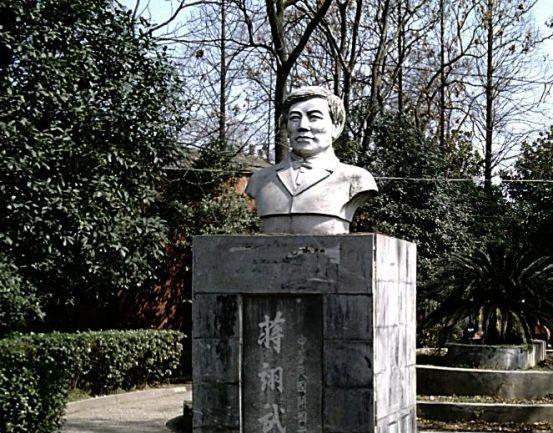He was the commander-in-chief of the Wuchang Uprising and the founding father of the Republic of China, and was later killed for opposing Yuan, and he was Jiang Yiwu.
Jiang Yiwu, born in a city civilian family in Lizhou, his father Jiang Gaonan was young and made soybean oil skin, because the old shopkeeper had no children, he left the property to Jiang Yiwu's father before he was born, so Jiang Yiwu's family conditions were not good or bad. His father attached great importance to the education of his children, so Jiang Yiwu had a good academic performance from an early age, and in 1903, Jiang Yiwu was admitted to the Hunan West Road Normal School in Changde with the first place in the school.
However, with the incompetence of the Qing Dynasty, Jiang Yiwu lived in an era when the Qing Dynasty became semi-feudal and semi-colonial, so a group of patriotic young people were also subjected to the Western revolutionary trend of thought, overthrowing the Qing Dynasty and establishing a new country and new policies. This led to a series of reforms and movements.

Jiang Yiwu was also affected, and also participated in the Changsha Uprising led by Song Jiaoren, when he was still studying in school, because of this incident, he was expelled from school, and had no choice but to avoid returning to his hometown. This does not mean that Jiang Yiwu has let go of his faith.
In the autumn of 1909, jiang Yiwu came to Hankou, and at this time the revolutionary activities in Hankou were very active, and many revolutionaries lurked in the new army, formed groups, and accumulated strength, so that many officers and soldiers accepted the revolutionary ideas. In this way, Jiang Yiwu also joined the new army. In the army, he met Liu Fuji, Zhan Dabei, and other revolutionaries, and in the new army, they propagated revolutionary ideas and ideas to enable a group of progressive young people to join, which also laid a good foundation for future uprisings.
Later, they also set up a literary society, which was ostensibly a literary exchange, but in fact a group of patriotic years gathered together to prepare for an uprising, when Jiang Yiwu was elected president, Wang Charter was vice president, and Liu Fuji was the chief of staff. The literary society has a membership of up to 15,000 people.
On September 7, 1911, the Qing Dynasty sold the right to build the Sichuan-Han and Guangdong-Han railways to Britain, France, Germany, and the United States, which also aroused strong opposition from the people of Hunan Province, Hubei, Guangdong, Sichuan and other provinces. At this time, Zhao Er, the governor of Sichuan, shot and killed hundreds of petitioners and arrested representatives of the Baolu Comrades' Association. This provoked greater anger among the people of Sichuan, when Rong County declared its independence, and the county became the first regime in China to break away from the Qing Dynasty. The Baolu Movement became a precursor to the Wuchang Uprising.
As a result of the Sichuan uprising, the Qing court sent a new army from Hubei into Sichuan to suppress it, so that the defense of Hubei weakened, at which point Jiang Yiwu decided to launch an uprising in Wuchang. At that time, the military commander-in-chief was Jiang Yiwu, the chief of staff was Sun Wu, and the premier was Liu Gong.
On the 12th, Jiang Yiwu proposed to expand the army and form two volunteer armies to defend Hankou and Hanyang. He was later appointed Vice Minister of military affairs of Hubei Province. On November 27, hanyang fell, Huang Xing left Han, and Jiang Yiwu was promoted to be the supervisor of the wartime headquarters, and later took over as the commander-in-chief of nursing, responsible for command.
The revolutionaries in Hankou were moved by the wind and restored Hanyang and Hankou on the night of October 11, 1911, and October 12, 1911, respectively. After the rebel army took control, the Hubei military government was established, and Li Yuanhong was elected as the governor of the country, changed the name of the country to the Republic of China, and called on the people of the provinces to respond to the uprising.
The Wuchang Uprising, on the other hand, overthrew the Qing Dynasty and ended more than two thousand years of absolute monarchy. Within two months of the uprising's victory, fifteen provinces, including Hunan and Guangdong, announced their independence from the Qing government. Later, Sun Yat-sen was elected interim president. Thus ended more than 200 years of feudal rule of the Qing Dynasty and more than 2,000 years of feudal imperialism.
After February 1912, however, a post was stolen. Due to Jiang Yiwu's opposition, he was awarded the rank of lieutenant general and added the rank of general, but he still chose to leave and join Sun Yat-sen's National Association. This also became the scourge of his killing.
On August 29, 1913, Jiang Yiwu was arrested by the subordinates of a local warlord in Quanzhou, Guangxi, and later called Yuan Shikai to say how to deal with it, and Yuan Shikai said that he would never have any trouble. In this way, Jiang Yiwu was 28 years old when he was killed for opposing Yuan.
And Sun Yat-sen had a high opinion of Jiang Yiwu: Wuchang of Xinhai was difficult, crowned with public merit, and the founding father of the Republic of China.